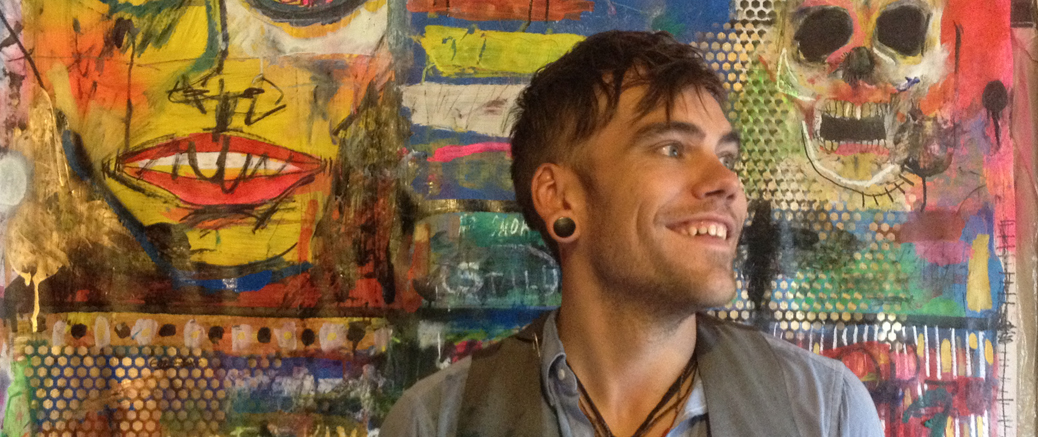INTERVIEW: Trevor Richardson
By Kody Ford
Editor
A few months ago, I had the pleasure of seeing Trevor Richardson give a reading from his debut novel American Bastards. Besides being a helluva nice guy, Trevor is pretty gifted wordsmith, who can wield a simile like it’s nobody’s business. His prose is neo-Kerouac and he possesses the ability to draw you into his twisted world through his rapid fire delivery and charismatic stage presence. Ergo, I knew he’d be perfect to interview for the debut issue of The Idle Class. Here’s what he had to say:
On Writing:
Trevor: “I often tell people that I feel like one of the least literary (or is it literate?) writers ever. I love books, but don’t like most things people choose to write. I think it was George Bernard Shaw that said he felt like an ordinary man who just felt compelled to write. I don’t know what book that’s from but I know I relate to it. I’m just a dude that isn’t happy unless he’s juggling words. That said, I don’t have very many influences; I don’t believe in most of the collegiate philosophies on writing; I’ve never finished a creative writing course in my life; and I think Jonathan Franzen kind of sucks.
“I get more ideas for books from listening to Bob Dylan, Tom Waits, Johnny Cash, or Willie Nelson than I ever got from Melville or Steinbeck. Stylistically, too, the choice of how to use words or what not to say comes more often from lyrics than literary influence. I feel like a rock star at heart, but I lack the technical skill to make good music, so instead I write and find excuses to get on stage. Also, a little side note, the first chapter I ever wrote for American Bastards was inspired by “Back of a Truck” by Regina Spektor. Say what you want about her being too cute or too trendy or too commercial these days, but when I first heard that weird song I said, ‘I want to write something like this.’ The end result is this book.”
On Getting Published:
Trevor: “My book got published because I was unemployed and looking for work on Craigslist. Weird, right? I know. I found my publisher through a job posting. They wanted someone to help them with marketing, social media, and order management. I went in, completely under qualified, but somehow got an interview. I made an impression, but not in the way I intended. As a writer, rather than an employee. They hired somebody that actually went to school for this stuff, go figure. But they told me they wanted to publish American Bastards. And there you have it. I wound up getting a job at a 60 year-old Portland party store working with costumes and balloons and noisemakers and still got a published novel out of the deal which is, after all, the only reason I applied for the job.”
On Being a Writer:
Trevor: “It’s weird. There’s always one more hurdle in front of you that keeps you from feeling legitimate. Like, ‘It’ll feel real once the book is in my hands, printed.’ You get that and it still doesn’t hit, so then it’s, ‘When I get my first royalty check.’ No, still not feeling it. ‘Maybe my first radio interview?’ I’ve done all this stuff. Interviews with magazines, on the radio, I just finished my first book tour, I did a big reading in New York City, I have my book in stores…I still just feel like a normal guy, a young, aspiring writer that is baffled by the change in how people treat me. That’s the biggest thing.
“When you’re trying to publish your first book nobody cares, you aren’t special, you’re just another guy with another manuscript that looks and sounds like a million others. Everybody has a book, you know? A lot of them are probably better than mine but go unpublished. But then, through some twist of fate, you get your book out there and suddenly, simply because it’s on a few shelves in a place other than your house, you become an expert. Now you’re a professional. Now these same people want to know about your process, your opinion, you get invited to do readings, to do talks at schools, all kinds of weird stuff. To a cynical country boy like me, it feels kind of hypocritical. Like, ‘Yesterday you sent me a form rejection letter and now you want me to do what?’
“Incidentally, I think I will feel like a real writer when my next book comes out.”
On Literature Going Digital:
Trevor: “Literature has gone digital. It’s not hypothetical anymore. The vast majority of publishers are using digital methods…In my opinion, anything to get people reading again is a good thing. If we have to sacrifice the feel of the pages in your hand in order to keep America literate, then I’m all for it. That said, books aren’t going anywhere…[T]here will always be people that want their bookshelves full so they look impressive to houseguests. What did I say earlier, I am more influenced by music than literature? Well, here’s a music analogy for you. How many times have people said vinyl is dead? And yet how many bands can you list right now that just put out a vinyl record, an actual LP? I could name a dozen easy.
“In the same way, book collectors will always want books, if anything, the dividing line will get thicker, you’ll have a book that is purely digital or only available in an ornate hardbound copy. In the end, it doesn’t affect writers much at all, we’ll still write and sell and earn royalties and get our stuff out there. Furthermore, digital makes distribution faster and easier, so we might be worrying for no reason, it’s possible there’s a brighter future in Kindles and the like than we give credit for. It’s all up to the readers, it’s always been up to the readers. You should interview one of them.”
On Being Published by Small Press:
Trevor: “A small Press is a double-edged sword, pardon the cliche. You have a lot more creative freedom, you know your publisher and editors personally, it’s a friendly more communal environment, and they’re typically more committed to quality than the bigger publishers. The big publishers have a lot of extra pressures that result in them making fiscal decisions over artistic ones. However, the small presses also don’t have a lot of money so their ability to reach a large audience is limited. I say for a writer in the position to choose you just have to ask yourself which is more important, knowing your book is going to be printed in the way that you wrote it, or possibly getting it sold to a ton of people over night.
“The thing is, you can still succeed even without the resources offered by a big conglomerate, you just have to be willing to work hard, collaborate and be inventive. Moreover, it’s extremely rare that a big publishing company is going to do much more for your first novel than a small press will. It just isn’t a good cost-risk ratio or whatever they call it. In the end, I’d say write the book you love, expect it not to be a bestseller overnight, just work on making something really good and work hard to reach your audience, and save the dreams of quitting your day job and financial success and accolades or whatever reasons you have for doing this for the next book. But this is key, make something good, that you love, not just something you think will sell.
Advice for Writers & Other Musings:
Trevor: “Don’t wait around for someone to find you. If you’re getting rejected, start your own publishing company and publish yourself. If you don’t know how to do that then find a friend that loves books and figure it out. This talk about going digital means one thing: hard times for the longstanding publishing giants, and possibilities, innumerable possibilities, for the crafty, self-reliant and driven author…The truth is, there will never be a time when you “get discovered” and suddenly you are magically on talk shows or radios or magazine covers. All of it takes work, phone calls, emails, and nagging. You have to plug away at every small success…I wasted years waiting and hoping and mailing letters, if someone had told me what I just said things would have been really different. There are so many resources out there just on the Internet alone use them, find them, and just do it for yourself. It doesn’t make you a fake writer or a failure because you didn’t find some suit in New York to sell for you. It makes you a daring, DIY creative type who wouldn’t take no for an answer.
“The future of art, in my opinion, is not in looking for bigger companies with bigger funds to do it for you. It’s in doing it yourself. Moreover, it’s in working together, not alone. If you’re a writer, don’t just seek out other writers, find musicians, painters, actors, poets, dancers, and bring them all together. There’s no reason to be so divided and compartmentalized that is a way of thinking devised and propagated by the same people that are rejecting your work right now. The only thing that matters is finding people in the same boat you are in, trying to make it, trying to find an audience, and trying to make something good. Remember that and pursue it. See where it takes you. And if you get something together, invite me, I want to know about it. I’m serious, I’m just a dude, I want to know you. Email me at trevor@americanbastards.com. That’s my real email; this is not a joke. We are going to change the art world by relying on each other, not by relying on bigger business powers to grant us success with the wave of a wand or a finger or a laser pointer. That is all.”
(This was originally published on The Idle Class Tumblr last fall.)





Comments